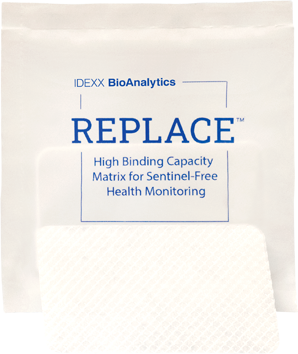Environmental Health Monitoring (EHM)
The best real-time PCR-based solution for animal health monitoring

Environmental Health Monitoring begins with REPLACE™
REPLACE™ is an advanced high binding capacity matrix that significantly enhances rodent colony environmental health monitoring (EHM). It offers a client-focused solution that effectively addresses prevalent challenges. REPLACE™ eliminates the need for sentinel animals, enhances pathogen detection, and versatile placement options allow it to be compatible with any rodent housing system.
Learn more about REPLACE Sentinel-Free Soiled Bedding (SFSB) →

EDx Panels: Simply better
Environmental health monitoring eliminates the need for sentinel animals while also reliably allowing for better space management, reduced workload, and less time to collect samples.
When it comes to rodent diagnostics, our EDx panels provide a more significant detection of bacteria and parasites than soiled bedding sentinels, allowing for faster detection of pathogens and simpler animal health management.
Our PCR-based testing service options provide more customizable animal health monitoring, with results in just three days.
Modernization in animal health monitoring begins here
No Need for Sentinels
Eliminates the need for sentinel animals by using Sentinel-Free Soiled Bedding (SFSB) and Exhaust Dust Testing (EDT), ensuring ethical and efficient monitoring.
Significantly Improved Diagnostics
REPLACE™ high binding capacity matrix for enhanced pathogen detection, capturing low amounts of nucleic acid particles in soiled bedding.
Suits Your Housing Environment
Works seamlessly with all rodent housing systems, offering flexibility and ease of integration into existing workflows. Saves time and space.
Uncompromising Quality
Ensures rigorous quality control with each lot tested for optimal pathogen detection and absence of contaminants, guaranteeing reliable results.
Fast, accurate, and reliable results from the team you know and trust.
Connect with IDEXX BioAnalytics today.